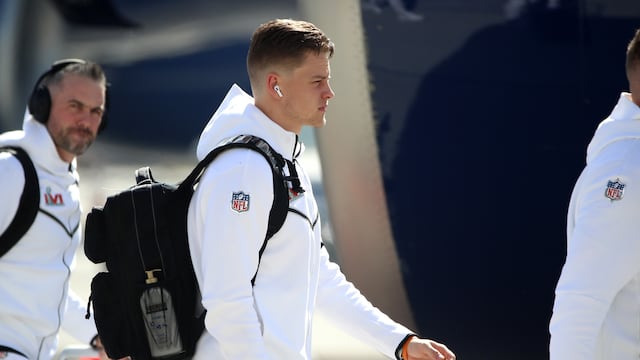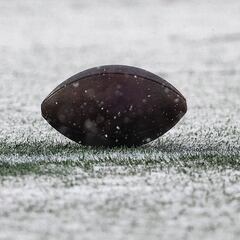National Football League teams’ players staying in hotels for home games may surprise some, but it’s not uncommon. Here’s why and how it works.

Why do NFL players stay in hotels at home games? Do they share rooms?
When Aaron Rodgers was still playing for the Green Bay Packers, he made headlines with something he said. No, I’m not talking about his stance on the COVID-19 vaccine or his opinions on Ayahuasca. I’m talking about the back pain he suffered from due to a particular rule that the Packers have in place. Rodgers called the rule an “antiquated procedural thing in our league,” which requires the team to sleep in a hotel the night before home games.
The origins of the idea
Historically, coaches were concerned that young players would hit the town instead of getting a good night’s sleep. Having a fantastic offensive line is not good if they are hungover on Sunday morning. In the early days of the league, the owners on their squads ran things with a much more firm grip.
Almost military, a football team would have had much more control over their private lives exercised. This would mean that players could be fined or even fired for things like drinking, smoking, carousing the town, and, of course, having a weakness for the ladies. Even for the players who were married, expending energy in the bedroom with a partner would be seen as a dereliction of duty on the field.
Many of these sentiments extend into the modern era. No matter that they have been scientifically debunked, anyone who has played any sport, be that football, baseball, basketball, boxing, whatever, will have been told all their lives that “women weaken legs.”
In recent decades, of course, players are not seen so much as belonging to a team as being contracted by them. They have far more autonomy and respect than their predecessors did. But many of these antiquated rules have been kept on by many teams as a sort of team-building measure. And it is valid to some extent that being together outside of “office hours” helps unit cohesion.
Anyone you share a roof with becomes family in a sense that is much more real than symbolic. Breaking bread is a sacred act, and doing so together binds us closer to our comrades. Teams have long used these moments to discuss tactics in a less formal setting in an effort to bring the disparate players into a whole.
Teams commonly spend time together at all levels of sport
😂😂 @elleduncanESPN with the great analysis of an NFL player trying to sneak a woman into his hotel room. @SarahSpain with the reaction lol pic.twitter.com/umEo10wKgU
— El Maestro (@PittsfallII) August 13, 2020
The pandemic twist
During the pandemic of the 2020 season, the NFL elevated this selective tradition to an actual league mandate. The rule reads: “The Home Team will be required to stay at the team hotel the night before each game. All hotels must comply with the requirements in the Team Travel Protocol and provide parking for all players and essential staff segregated from the public.”
No longer could smaller market teams, or teams that had not seen the sense in wasting money in this way, choose to have their players sleep in their beds the night before a game. And this is where Aaron Rodgers comes into the fray. He blamed his chronic back pain on having to sleep in an unfamiliar bed on what is arguably the most important night’s sleep of the week, and he is 100% correct.
Leaving aside arguments about drinking and carousing, there are far more sensible ways to maintain a COVID-protected environment. One would be mandatory vaccination for players and their immediate families (although that solution would not have satisfied Rodgers either). Another would make it a breach of contract to be in close proximity to people outside of your close social bubble. There were many routes the league could have taken, but hotel stays were the ones they landed on.
The Pittsburgh Steelers are staying at the Carton House for their game in Dublin this weekend.
— Joe Pompliano (@JoePompliano) September 27, 2025
• Built in 1739
• 1,100-acre estate
• 5-star Fairmont hotel
• Two championship golf courses
• Spa and Michelin-star restaurant
The Steelers have taken over all 169 rooms. pic.twitter.com/M9HJ6I0jkk
They can’t all stay in the penthouse suite
The marquee players will get their rooms, and some might even get something plush. But rookies and lesser-known players will have to bunk up with a teammate. Imagine your own work colleagues. How many of them would you like to share a Holiday Inn double room with?
Related stories
Former NFL defensive end Stephen White wrote for Bleacher Report a few years ago, “Some guys snore, others stay up all night on the phone, and still some have poor hygiene. Any of those situations, or many others not listed, could contribute to you not having a good night’s sleep — something that is usually vital to performing well the next day.”
Get your game on! Whether you’re into NFL touchdowns, NBA buzzer-beaters, world-class soccer goals, or MLB home runs, our app has it all. Dive into live coverage, expert insights, breaking news, exclusive videos, and more – plus, stay updated on the latest in current affairs and entertainment. Download now for all-access coverage, right at your fingertips – anytime, anywhere.


Complete your personal details to comment